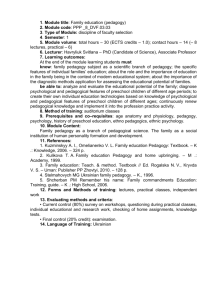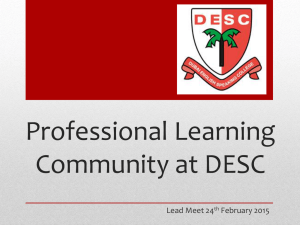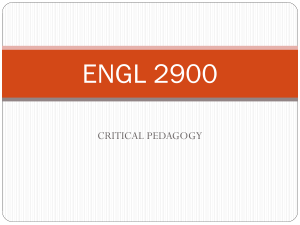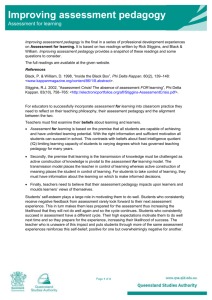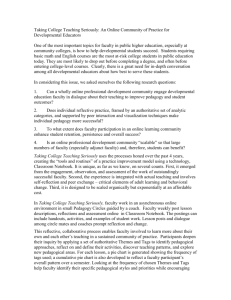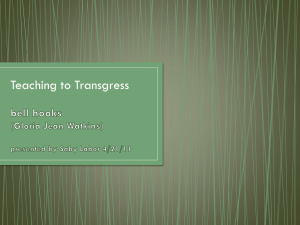INSTRUCTIONAL TEAM:
advertisement
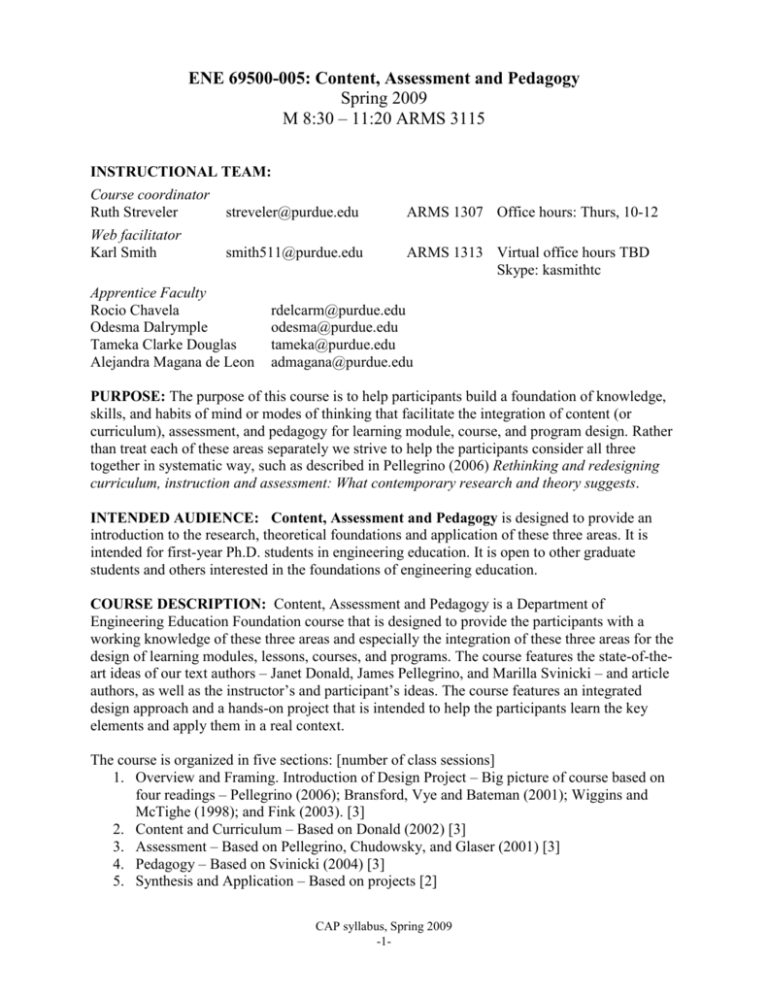
ENE 69500-005: Content, Assessment and Pedagogy Spring 2009 M 8:30 – 11:20 ARMS 3115 INSTRUCTIONAL TEAM: Course coordinator Ruth Streveler streveler@purdue.edu ARMS 1307 Office hours: Thurs, 10-12 Web facilitator Karl Smith smith511@purdue.edu ARMS 1313 Virtual office hours TBD Skype: kasmithtc Apprentice Faculty Rocio Chavela Odesma Dalrymple Tameka Clarke Douglas Alejandra Magana de Leon rdelcarm@purdue.edu odesma@purdue.edu tameka@purdue.edu admagana@purdue.edu PURPOSE: The purpose of this course is to help participants build a foundation of knowledge, skills, and habits of mind or modes of thinking that facilitate the integration of content (or curriculum), assessment, and pedagogy for learning module, course, and program design. Rather than treat each of these areas separately we strive to help the participants consider all three together in systematic way, such as described in Pellegrino (2006) Rethinking and redesigning curriculum, instruction and assessment: What contemporary research and theory suggests. INTENDED AUDIENCE: Content, Assessment and Pedagogy is designed to provide an introduction to the research, theoretical foundations and application of these three areas. It is intended for first-year Ph.D. students in engineering education. It is open to other graduate students and others interested in the foundations of engineering education. COURSE DESCRIPTION: Content, Assessment and Pedagogy is a Department of Engineering Education Foundation course that is designed to provide the participants with a working knowledge of these three areas and especially the integration of these three areas for the design of learning modules, lessons, courses, and programs. The course features the state-of-theart ideas of our text authors – Janet Donald, James Pellegrino, and Marilla Svinicki – and article authors, as well as the instructor’s and participant’s ideas. The course features an integrated design approach and a hands-on project that is intended to help the participants learn the key elements and apply them in a real context. The course is organized in five sections: [number of class sessions] 1. Overview and Framing. Introduction of Design Project – Big picture of course based on four readings – Pellegrino (2006); Bransford, Vye and Bateman (2001); Wiggins and McTighe (1998); and Fink (2003). [3] 2. Content and Curriculum – Based on Donald (2002) [3] 3. Assessment – Based on Pellegrino, Chudowsky, and Glaser (2001) [3] 4. Pedagogy – Based on Svinicki (2004) [3] 5. Synthesis and Application – Based on projects [2] CAP syllabus, Spring 2009 -1- As an ENE “foundation” course – the course is also designed to: • Provide students with an understanding of theories, principles and practices in content (or curriculum), assessment and pedagogy. • Contribute to students’ satisfying the Graduate Competencies, especially Apply Engineering Education Principles to the Solution of Instructional or Curricular Problems(5), and to some extent Synthesize Knowledge (1), Communicate Knowledge(3), Think Critically and Reflectively (4). It also has implications for but does not specifically address Teach Engineering (10). • Provide some foundation regarding central research needs in engineering education: Engineering Epistemologies (nature of engineering knowing), Learning Systems (structure, culture, and organization of engineering education), Learning Mechanisms (attributes of engineering thinking), Diversity and Inclusiveness (engineering identity and membership, access, barriers), and Engineering Assessment (assessment methods, instruments, and metrics). • Provide opportunities and experiences to integrate content, assessment and pedagogy. • Provide a “community of practice” culture in which students have opportunities to form their own community as well as participate within the broader community of engineering education via engagement in our practices, methods, and beliefs. COURSE OBJECTIVES: 1. Develop and articulate an integrated design approach for content, assessment and pedagogy. 2. Critically describe the research-based features of each of the elements – content, assessment and pedagogy. 3. Apply the principles and theories to the design of a course, module, lesson plan, or other instructional setting. 4. Use reflection and dialogue as a tool of self-discovery for shaping and refining personal philosophies for the design of instruction. 5. Participate in a “community of practice” culture through formation of our own community and participation in the broader community of engineering education. If you are a person with special circumstances that you believe will affect your class performance (e.g., visual, hearing or learning disabilities or language differences) please let us know if we can make appropriate accommodations. The Adaptive Services website is located at: http://www.purdue.edu/odos/adpro/. COURSE ACTIVITIES: Course activities will involve: - Explore content, assessment and pedagogy – via textbooks, journal articles and archival research – and through reflection, writing and dialogue. - Reflect on and discuss the integration of content, assessment and pedagogy - Conduct a preliminary design project for a class session, learning module, laboratory session, etc. that may be part of a course CAP syllabus, Spring 2009 -2- We will use the following texts that we think would also be a valuable contribution to your permanent reading library: Donald, Janet. 2002. Learning to think: Disciplinary perspectives. San Francisco: JosseyBass. Pellegrino, James W., Chudowsky, Naomi, and Glaser, Robert (editors). 2001. Knowing what students know: The science and design of educational assessment. Washington, DC: National Academy Press. Svinicki, Marilla. 2004. Learning and motivation in the postsecondary classroom. Bolten, MA: Anker Publishing Company. Overview and Framing Articles: (will be made available on Blackboard) Bransford, John, Vye, Nancy, and Bateman, Helen. 2002. Creating High-Quality Learning Environments: Guidelines from Research on How People Learn. The Knowledge Economy and Postsecondary Education: Report of a Workshop. National Research Council. Committee on the Impact of the Changing Economy of the Education System. P.A.Graham and N.G. Stacey (Eds.). Center for Education. Washington, DC: National Academy Press. Fink, L. Dee. 2003. A Self-Directed Guide to Designing Courses for Significant Learning. (Notes based on Fink, L. Dee. 2003. Creating significant learning experiences: An integrated approach to designing college courses. San Francisco: Jossey-Bass). Krajcik, Joseph; McNeill, Katherine L.; Reiser, Brian J. 2008. Learning-Goals-Driven Design Model: Developing Curriculum Materials that Align with National Standards and Incorporate Project-Based Pedagogy. Science Education, 92(1), 1-32. Middendorf, Joan and Pace, David. 2004. Decoding the Disciplines: A Model for Helping Students Learn Disciplinary Ways of Thinking. New Directions for Teaching and Learning, 98. Pellegrino, James W. 2006. Rethinking and redesigning curriculum, instruction and assessment: What contemporary research and theory suggests. Paper commissioned by the National Center on Education and the Economy for the New Commission on the Skills of the American Workforce. http://www.skillscommission.org/commissioned.htm Wiggins, Grant and McTighe, Jay. 1998. Understanding by Design. Alexandria, VA: ASCD. Chapter 1 “What is backward design?” Other Readings: Each student will develop a reading list in the area they are pursuing for their project. COURSE REQUIREMENTS AND GRADING: This is a graduate level class with a strong focus on the design of learning environments. It is our hope that by being transparent with our course design philosophies and practices you as the student will learn about content and ways of teaching and assessing. It is our belief that through engaging in this learning environment you will master the content, draw connections to personal research interests, and push yourself to a higher level of thinking in engineering education. CAP syllabus, Spring 2009 -3- Here are our thoughts on the learning environment: Quality of learning is more important than grades (i.e., what you get out of the assignment is more important than “bean counting” points). This class is not about “the answer.” It is about your answer as developed through reflection, critique, and synthesis of literature, thoughts and ideas. It involves questioning your own assumptions and ideas AND learning how to listen to and understand other’s ideas. It involves iterative feedback on projects to help further develop ideas. It is about having clear objectives and expectations. We expect that you will: 1. Attend all classes (if you must miss a class, please let us know and (1) make arrangements with other group members for a summary and review, (2) do additional work for the benefit of the other folks in the class, e.g., summarize a set of articles we don’t have time to read, or attend a seminar of relevance and distribute notes to the class). 2. Fully engage in all classes. Full engagement requires reading all assigned materials by the assigned time, actively participating in class discussions and activities, and completing quality work. 3. Participate in on-going assessment of class so we can be sure our learning intentions are matching your learning experience. 4. Complete and submit a course evaluation so we have constructive feedback for use in improving this class. 5. Follow scholastic conduct policy: http://www.purdue.edu/univregs/pages/stu_conduct/stu_regulations.html ASSIGNMENTS The principal assignment for the course is an individual project paper that is due Monday, May 4, 2009. The production of this final design project paper will occur in a series of stages,: 1. A first draft that begins to show the development of your ideas and is grounded in conceptual and theoretical frameworks. 2. Subsequent drafts that integrate the ideas from the previous stages. 3. An oral presentation of your ideas which focuses on your overall synthesis of the project. 4. A final draft that integrates all the stages and incorporates feedback from previous drafts. The stages are: 1. Project overview. 2. Content aspect. 3. Assessment aspect. 4. Pedagogy aspect. 5. Overall synthesis. CAP syllabus, Spring 2009 -4- COURSE SCHEDULE [tentative] Date Class focus Jan 12 Course overview, introductions, CAP model NO CLASS (MLK Day) Integrated design approach, discuss readings, feedback on preliminary idea for design site Integrated assessment approach, peer feedback on first draft of paper Begin discussion of “content” with focus on readings Content Content, continue discussion with focus on second draft of paper Jan 19 Jan 26 Feb 2 Feb 9 Feb 16 Feb 23 March 2 Assessment Mar 9 Mar 16 Mar 23 Assessment SPRING BREAK Assessment, feedback on third draft of paper Mar 30 Pedagogy April 6 April 13 Pedagogy Pedagogy April 20 April 27 May 4 Student presentations Student presentations Finals weeks begins Assigned Readings Due Date (may “jigsaw” via study groups) Writing (will receive instructor and peer feedback) Read articles by: Pellegrino; Bransford; Krajcik et al. Skim articles by: Fink; Wiggins & McTighe Read Middendorf & Pace Idea for design site First draft of project paper(overview) Donald, Read Chs 1, 3, 9, Skim chapters 2, 4, 7 Second draft of project paper (overview and content) Pellegrino, Read Chs 2, 3, Skim chapters 1, 4 Third draft of paper (overview, content and assessment) Svinicki – skim entire book, careful reading of chapters most appropriate for your project Fourth draft of the paper (overview, content, assessment and pedagogy) Final draft of project paper (integration of all pieces) CAP syllabus, Spring 2009 -5-
